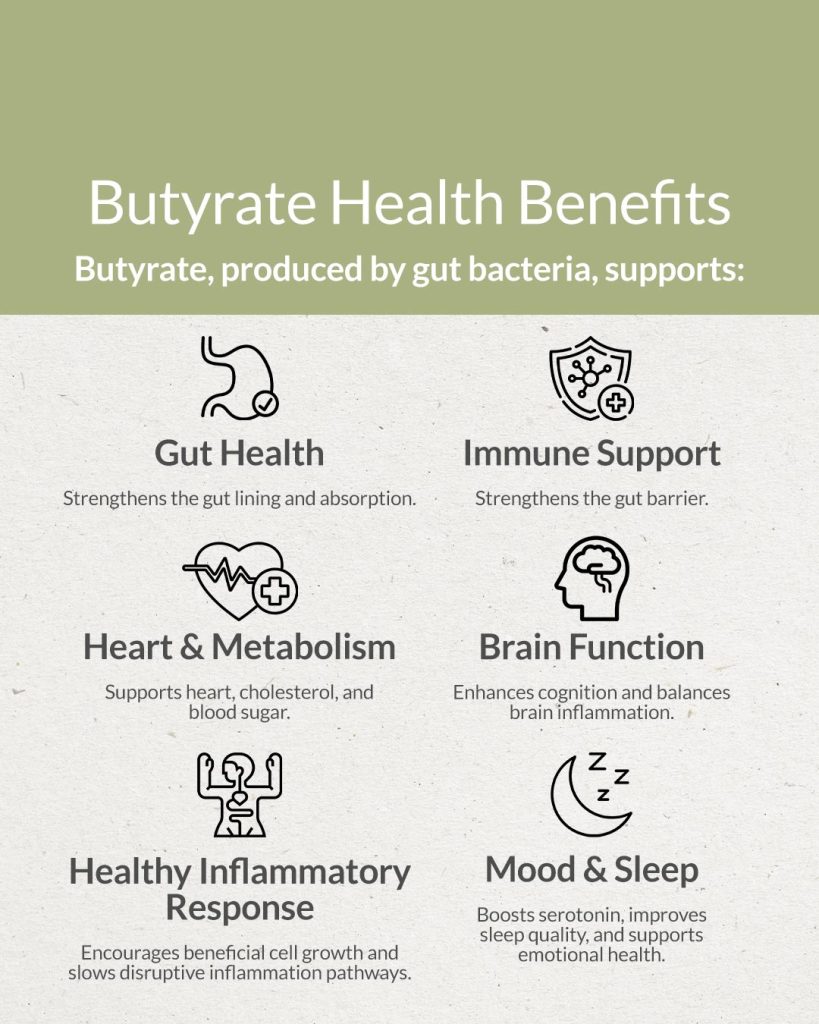
Why Butyrate Matters: Health Benefits and How to Increase It Naturally


Why Butyrate Matters: Health Benefits and How to Increase It Naturally
You know that your gut and gut flora have big impacts on your health, but perhaps not much about how. One of the ways includes the gut’s production of postbiotics like butyrate, acetate, and propionate. Perhaps butyrate is one of the best-studied ones for its crucial health benefits. But like any good thing, balance is key.
Things like diet, lifestyle, and the health of your microbiome can affect how much butyrate your gut bacteria produce. In this article, we’ll look at why butyrate is so important, how it supports your health, and how you can boost your levels through food, supplements, and lifestyle choices.
What Is Butyrate and How Is It Produced?

Let’s break down what butyrate is. It is a small fatty acid that some gut bacteria produce when they ferment fibers. A small amount can also come from protein when your body processes amino acids like glutamate and lysine.
Even though it’s a fatty acid, your body doesn’t get it from eating most fatty foods—it’s made in your gut.
When the gut produces butyrate, the cells lining the intestine and colon primarily use it as fuel, which helps keep them healthy. Any remaining butyrate then travels to the liver, where it provides energy for liver cells. From there, a small amount enters the bloodstream and supports different bodily functions.
What Are the Health Benefits of Butyrate?

What may begin in the gut has health benefits throughout your body and your well-being. Let’s get started in the gut and work our way out.
Gut Integrity
Your gut lining protects your body from your gut content, which may include some harmful bacteria and toxins. When the gut lining is strong, it also helps your body absorb the nutrients from food that fuel your health and well-being.
But the gut isn’t just about digestion—it’s also a major player in your immune system. Keeping your gut intact means better control over your immune responses. When your gut barrier is leaky, it exposes some of your gut content to the immune system, which could cause bigger health problems down the road.
Butyrate is important for keeping your gut healthy by:
- Serving as the primary energy source for the cells lining your colon, helping them stay strong and work well.
- Stabilizing a protein that supports the gut’s low-oxygen environment and keeps the cells tightly connected, strengthening the gut barrier.
- Reducing irritation in the gut and boosting the production of natural defenses that protect the gut lining from harmful bacteria.
- Tightening the tight junctions between your gut lining cells
Healthy Inflammatory Response
Butyrate helps support a balanced inflammatory response in the body in a few key ways:
- Activating balancing immune receptors and signals like IL-10, which help regulate the body’s natural defenses.
- Lowering certain signals (such as IL-6 and IL-12) and pathways that can contribute to an excessive response.
- Maintaining balance by encouraging the growth of beneficial cells while slowing down those that could disrupt harmony.
Together, these effects promote a healthy inflammatory response, supporting the body’s overall function.
Healthy Immune Function
About 70% of your immune system is housed in the gut, so a healthy gut and gut flora are key to immune function. Butyrate helps by:
- Increasing IL-10, butyrate ensures that your immune system responds appropriately when needed.
- Reducing the production of IL-17, which can sometimes lead to an overactive immune response.
- Strengthening the gut barrier as a fuel and regulator of gene readouts, including IL-22, a protein that strengthens the gut barrier and immune defenses.
Cardiovascular and Metabolic Health
Butyrate supports heart health in several significant ways, working at multiple levels to promote cardiovascular well-being. A review of studies explored its critical role.
- Supports mitochondrial and metabolic health
Mitochondria—the powerhouses of your cells—play a crucial role in heart function by producing the energy needed for each heartbeat. Butyrate helps make new mitochondria and make them more efficient, helping heart cells generate ATP more effectively. In addition, your mitochondria health is linked to blood sugar control, blood lipids, and several other aspects of heart and metabolism.
The mitochondria not only fuel the heart but also enhance metabolic flexibility, ensuring the cardiovascular system can adapt to changing energy demands. By improving mitochondrial function, butyrate also helps:
- Improve your body’s antioxidant response and
- Supports a healthy inflammatory response
In these ways, butyrate helps prevent unnecessary strain on the heart and blood vessels, ensuring they can function optimally.
- Supports healthy cholesterol levels
Butyrate regulates cholesterol levels by influencing how your liver metabolizes cholesterol. It helps control cholesterol levels in the liver by reducing the production of certain substances that create cholesterol. Butyrate also lowers the activity of an enzyme that plays a key role in making cholesterol.
- Improves insulin response and supports healthy blood sugar level
Butyrate helps your cells respond better to insulin, which is responsible for controlling blood sugar levels. When your body is more sensitive to insulin, it requires less to regulate blood sugar, helping maintain stable blood sugar levels and preventing the strain that high blood sugar and insulin can put on the cardiovascular system.
Researchers studied 952 people with normal blood sugar to see how butyrate affects insulin production. They looked at factors like genetics, gut bacteria, and the levels of short-chain fatty acids (SCFAs), including butyrate, in their stool.
The results showed that people with higher butyrate production had a better insulin response, suggesting that butyrate may help the body manage blood sugar more effectively. On the other hand, imbalances in another SCFA, propionate, were linked to a higher risk of blood sugar problems. Additional data from the UK Biobank supported these findings, highlighting butyrate’s potential role in metabolic health.
- Helps regulate blood pressure
Butyrate also has an impact on blood pressure. It influences immune system cells, including T-helper 17 and regulatory T cells, which help regulate blood pressure. By promoting a balance between these cells, butyrate helps maintain healthy blood pressure levels, easing the strain on the heart.
- Reduces stress on the heart via the gut-brain connection
Finally, research suggests that butyrate may communicate with the brain via the gut-brain connection, affecting neural pathways that influence heart health. Through this pathway, butyrate may help reduce stress on the cardiovascular system, promoting overall heart function and resilience.
Protects Brain Health and Supports Cognition
Butyrate plays a key role in brain function by acting as an HDAC inhibitor. When HDAC is blocked, this increases levels of brain-derived neurotrophic factor (BDNF), a protein essential for brain cell growth and function. This process can improve brain functions like learning and memory.
In addition to supporting brain functions, butyrate is an energy source for brain cells, helping them produce the energy they need to function.
Finally, once again, we’re highlighting butyrate’s ability to support a healthy inflammatory response. In the brain, it activates specific receptors, such as GPR109a, which help balance inflammatory responses. This can help maintain a healthy balance in the brain, supporting overall brain health and optimal function.
Enhances Sleep Quality

Researchers believe that butyrate could help promote sleep by interacting with certain areas in the body, like the liver and portal vein. These areas are important for processing gut signals, making them crucial for butyrate’s sleep-boosting effects.
The portal vein is a blood vessel that carries blood from your digestive organs, including the intestines, to the liver. It plays a key role in transporting nutrients and other substances absorbed by the gut. This is important because butyrate needs to be absorbed and processed through the portal vein to help regulate sleep.
In one animal study, scientists tested how butyrate affects sleep. The results were impressive: mice given butyrate experienced a significant increase in deep sleep and, on average, a 60% increase in overall sleep. This could be due to its BDNF-stimulating effect.
Even more interesting is that butyrate caused a drop in body temperature, which might also help explain why it promotes sleep. Your core body temperature naturally drops as you prepare for sleep, signaling to your body that it’s time to rest. This cooling effect is essential for initiating the sleep cycle, and butyrate seems to support this process.
Supports Mood Regulation
Better sleep, better gut, and better brain health lead to better moods, and those aren’t the only ways butyrate helps support mood regulation. Another way is by supporting serotonin, a neurotransmitter that helps keep mood stable. By boosting the activity and expression of the serotonin transporter, butyrate helps regulate serotonin levels, which is often linked to feeling good.
In a study, researchers looked at how butyrate and other short-chain fatty acids (SCFAs) affect the serotonin system in the gut. They used a special cell line that naturally produces the serotonin transporter (SERT) and treated the cells with different amounts of SCFAs.
When researchers treated the cells with butyrate, they found that SERT expression increased at both the mRNA and protein levels, and serotonin uptake increased by up to 50%. This suggests that butyrate might help regulate serotonin levels, which is important for mood and overall emotional health.
What Foods Support Healthy Butyrate Levels?

Now that we’ve explored how butyrate supports health, the next question is: how can you get more of it? While the body produces butyrate in the gut, certain foods can help boost its levels naturally. Let’s look at the best dietary sources for supporting butyrate production.
The goal is to reach optimal butyrate levels, not too low or too high. Too little, and you don’t reap the benefits of it. Too much can weaken the gut lining by making it more permeable, which may lead to intestinal damage. High levels may also trigger programmed cell death in intestinal cells, further disrupting the gut barrier.
Too much butyrate can make the body more vulnerable to certain bacterial infections or even cancers. High levels can increase the expression of a receptor (Gb3) in the gut and kidneys, which makes it easier for harmful bacteria like E. coli to cause infections.
A stool test is the best way to determine your butyrate production. This test can give you insight into your gut’s production of short-chain fatty acids like butyrate and help identify imbalances or deficiencies in your gut microbiome, which may affect your overall health.
Prebiotic Foods
Foods are generally a safe way to increase butyrate production.
A quick reminder: butyrate is produced when the bacteria in your gut ferment certain types of fiber. So, step one in boosting your butyrate production is to increase your intake of these fiber-rich foods –prebiotics. These fibers fuel the beneficial bacteria that help produce butyrate, supporting your gut health and overall well-being.
Certain bacteria in your gut play a direct role in producing butyrate. For example, Akkermansia muciniphila doesn’t produce butyrate by itself but works alongside butyrate-producing bacteria. By co-cultivating with these bacteria, Akkermansia helps boost butyrate production through syntrophic growth, where bacteria work together to support each other’s growth.
Another key player is Faecalibacterium prausnitzii. This one is a major butyrate producer. Its activity helps maintain healthy butyrate levels. However, this bacteria is not currently available as a dietary supplement as they cannot be grown in the presence of oxygen.
Prebiotic fibers, like inulin-type fructans, fructooligosaccharides, and polydextrose, help boost butyrate production more than probiotic supplements. These fibers serve as food for beneficial gut bacteria such as Akkermansia muciniphila and Faecalibacterium prausnitzii, supporting their growth and activity.
Here are some sources of prebiotic fibers you can add or increase in your diet:
- Garlic
- Onions
- Leeks
- Asparagus
- Bananas
- Chicory root
- Jerusalem artichokes
- Oats
- Apples
Resistant starches are a particular form of prebiotic fibers also known to increase butyrate because they are highly fermentable by gut bacteria. Some examples to add to your diet include:
- Green bananas
- Cooked and cooled potatoes
- Cooked and cooled rice
- Legumes (like lentils, chickpeas, and beans)
- Oats
- High-amylose corn
- Pasta that has been cooked and cooled
Fermented Foods
You probably already know that eating more fermented foods is great for the gut, but now I’ll add a bonus: They help support butyrate production.
A review of studies explored the effects of fermented foods on the gut microbiome, and they highlighted the following fermented foods to support butyrate production:
- Fermented milk products: These can significantly boost short-chain fatty acid (SCFA) levels, especially butyrate, in the gut.
- Swiss-type cheeses: Contain propionibacteria that ferment lactose into acetate and propionate, which are important precursors for butyrate production.
- Fermented soy milk: Linked to an increase in beneficial gut bacteria like bifidobacteria and lactobacilli, which support butyrate production.
- Kimchi: Associated with changes in gut microbiota that may encourage butyrate production.
Compounds like polyphenols and fiber in these fermented foods probably help support these beneficial changes.
Polyphenols
Speaking of polyphenols, getting more of those in your diet is a great way to increase butyrate production. Polyphenols are bioactive compounds found in various fruits, including berries. They include a variety of chemical compounds, such as phenolic acids and flavonoids.
They support butyrate production by encouraging the growth of beneficial bacteria, like Bifidobacterium and Lactobacillus, which are linked to higher levels of short-chain fatty acids (SCFAs) like butyrate.
Some of the best sources of polyphenols include:
- Berries (like blueberries, strawberries, and raspberries)
- Dark chocolate (especially 70% cocoa or higher)
- Nuts (such as almonds, walnuts, and hazelnuts)
- Olives and olive oil
- Red wine (in moderation)
- Tea (green, black, and white)
- Apples and apple juice
- Cherries and cherry nectar
- Grapes (especially red and purple)
- Citrus fruits (oranges, lemons, and grapefruits)
- Spices (like turmeric, cinnamon, and cloves)
- Legumes (beans and lentils)
Butyrate-Containing Foods
Butyrate is primarily produced in the gut, so it’s not commonly found directly in large amounts in foods. However, some foods do contain a small amount of butyrate:
- Butter (especially grass-fed butter)
- Cheeses (such as aged cheeses like cheddar and Swiss)
- Ghee (clarified butter)
Maintaining a diet rich in foods supporting butyrate production is one way to promote healthy butyrate levels. Next, we’ll explore other strategies for maintaining balanced butyrate production for optimal health.
Other Ways to Support Healthy Butyrate Levels

Probiotics
Most butyrate producers are not available as dietary supplements. However, common probiotic species like Lactobacilli and Bifidobacteria can support butyrate production in the gut.
Bacteria that produce lactate, which serves as a food source for key players in butyrate production, such as Eubacterium hallii and Anaerostipes caccae. They also help increase the number of bifidobacteria, which produce lactate that other gut bacteria can use to enhance butyrate production further. Lactobacilli and bifidobacteria support the growth of bacteria that convert lactate into butyrate, helping to restore a healthy balance of gut bacteria. This shift promotes the production of beneficial short-chain fatty acids, with butyrate taking the lead.
Building on the understanding of how probiotics enhance lactate levels and butyrate production, a study evaluated the effects of a 4-strain probiotic supplement on these processes. The supplement contained the following probiotic strains:
- Lactobacillus acidophilus
- Lactobacillus plantarum
- Lactobacillus rhamnosus
- Enterococcus faecium
To simulate the human gut, the researchers used a gut model to observe the interactions between the probiotics, gut bacteria, and the gut wall. The study measured bacterial diversity and short-chain fatty acid production over three weeks. Researchers observed the following:
- The probiotics successfully settled in the gut’s mucosal layer, suggesting they could have lasting effects.
- The probiotics increased lactate levels, which helped lactate-consuming bacteria grow, leading to higher butyrate production.
Our probiotics, Probiotic Breakthrough, and Microbiome Breakthrough are excellent sources of Lactobacilli, which support the growth of bacteria that convert lactate into butyrate.
Fasting
While a diet rich in particular foods can help increase butyrate, so can skipping out on it altogether for a specified amount of time.
Fasting, like during Ramadan or following an intermittent fasting schedule, can boost butyrate levels in the body, likely because it helps shift the gut flora. When you fast, the balance of bacteria in your gut shifts, encouraging the growth of specific bacteria that produce butyrate, a beneficial short-chain fatty acid.
A review of 28 studies explored the effects of fasting on the gut flora. Researchers determined that fasting can increase the presence of bacteria from the Lachnospiraceae family, which produce butyric acid. It also encourages the growth of Firmicutes, another group of bacteria that make butyrate. So, fasting affects your eating habits and supports a healthier gut environment that boosts butyrate production.
Exercise

Exercise may help increase butyrate levels by promoting the growth of beneficial gut bacteria that produce this short-chain fatty acid.
A meta-analysis of human and animal studies suggests that regular physical activity encourages the growth of these microbes, supporting gut health. While the evidence isn’t conclusive, animal studies indicate that running can reshape the gut microbiota and raise butyrate levels in the large intestine. Researchers observed similar effects in lean and overweight individuals, hinting at the broad potential of exercise.
While more research is needed to understand the link fully, staying active offers a range of benefits—making it a smart choice for gut health and beyond.
Butyrate Supplements
If you’re looking for an extra dose of butyrate, you may also want to explore supplementing with it. Typically, sodium or calcium-magnesium butyrate supplements smell like vomit (because butyrate is a key component of vomit). You’ll also need to take a lot–12 – 20 capsules– to reap any benefits because your gut lining cells rapidly consume them, leaving none left for the colon or other organs. Whereas, other forms such as triglycerides (tributyrin) or other delivery systems may deliver more health benefits.
Most fats are in triglyceride form, which is one glycerol attached to three fatty acids. Tributyrate is one glycerol attached to three butyrate. There may also be triglycerides that have both butyrate and other larger fatty acids.
A study tested two types of SCFA-enriched triglycerides—one that combines butyrate and hexanoate with long-chain fatty acids and the other, tributyrin caproin, made only of butyrate and hexanoate. The goal was to see how these affect absorption and metabolism in overweight men. In a lab test, the tributyrin caproin version released SCFAs quickly in the stomach, while the combination with long-chain fatty acids released them in the small intestine.
In a follow-up trial with 14 men, a 2,000 mg dose of the triglyceride with long-chain fatty acids led to higher levels of butyrate and hexanoate after meals than a placebo. All doses were well tolerated, with no digestive issues.
In another study, researchers looked at the effects of tributyrin on butyrate levels. Twenty-four healthy adults took either a low-dose (100 mg) or high-dose (200 mg) of tributyrin. The results showed no significant increase in fecal butyrate levels after supplementation. Researchers noted this could be due to how the body absorbs it or differences in gut transit time and microbial activity.
Despite these findings, researchers found that tributyrin supplementation didn’t harm the butyrate-producing bacteria in the gut. It also suggested that butyrate is produced and absorbed in the small intestine, then processed in the liver, as indicated by trends showing reduced levels of hs-CRP, a marker made by the liver.
Based on the results of these studies, it’s unclear how effective supplementation is for increasing butyrate. While some research shows that supplements like tributyrin can raise butyrate levels, the results are inconsistent, unlike fiber consumption. Factors like how the body absorbs and processes the supplement and individual differences in gut microbiome and metabolism can affect the outcomes.
Basic research suggests that supplementing with butyrate all the time may not be a good idea, as it changes gene readouts. This may change immune function, cause weight gain, or increase the risk of certain cancers. So, based on current evidence, foods and fibers are the safest options to increase butyrate.
Conclusion
Prioritizing a diet rich in prebiotic fibers, fermented foods, and polyphenols, along with a healthy lifestyle, can significantly support the natural production of butyrate, a key compound for gut health and overall well-being.
To further support your gut health journey, consider incorporating high-quality probiotics like Bioptimizers Probiotic Breakthrough and Microbiome Breakthrough into your daily routine. These are unique probiotic formulas designed to enhance the growth of beneficial gut bacteria, including those involved in butyrate production.
References
- Singh V, Lee G, Son H, et al. Butyrate producers, “The Sentinel of Gut”: Their intestinal significance with and beyond butyrate, and prospective use as microbial therapeutics. Front Microbiol. 2023;13. doi:10.3389/fmicb.2022.1103836
- Peng L, Li ZR, Green RS, Holzmanr IR, Lin J. Butyrate enhances the intestinal barrier by facilitating tight junction assembly via activation of AMP-activated protein kinase in caco-2 cell monolayers. J Nutr. 2009;139(9):1619-1625. doi:10.3945/jn.109.104638
- Siddiqui MT, Cresci GAM. The immunomodulatory functions of butyrate. J Inflamm Res. 2021;14:6025-6041. doi:10.2147/jir.s300989
- Amiri P, Hosseini SA, Ghaffari S, et al. Role of Butyrate, a Gut Microbiota Derived Metabolite, in Cardiovascular Diseases: A comprehensive narrative review. Front Pharmacol. 2022;12. doi:10.3389/fphar.2021.837509
- Sanna S, van Zuydam NR, Mahajan A, et al. Causal relationships among the gut microbiome, short-chain fatty acids and metabolic diseases. Nat Genet. 2019;51(4):600-605. doi:10.1038/s41588-019-0350-x
- Bourassa MW, Alim I, Bultman SJ, Ratan RR. Butyrate, neuroepigenetics and the gut microbiome: Can a high fiber diet improve brain health? Neurosci Lett. 2016;625:56-63. doi:10.1016/j.neulet.2016.02.009
- Szentirmai É, Millican NS, Massie AR, Kapás L. Butyrate, a metabolite of intestinal bacteria, enhances sleep. Sci Rep. 2019;9(1):7035. doi:10.1038/s41598-019-43502-1
- ElGrawani W, Sun G, Kliem FP, et al. BDNF-TrkB signaling orchestrates the buildup process of local sleep. Cell Rep. 2024;43(7):114500. doi:10.1016/j.celrep.2024.114500
- Buey B, Forcén A, Grasa L, Layunta E, Mesonero JE, Latorre E. Gut Microbiota-derived short-chain fatty acids: Novel regulators of intestinal serotonin transporter. Life (Basel). 2023;13(5):1085. doi:10.3390/life13051085
- Peng L, He Z, Chen W, Holzman IR, Lin J. Effects of butyrate on intestinal barrier function in a caco-2 cell monolayer model of intestinal barrier. Pediatr Res. 2007;61(1):37-41. doi:10.1203/01.pdr.0000250014.92242.f3
- Zumbrun SD, Melton-Celsa AR, O’Brien AD. When a healthy diet turns deadly. Gut Microbes. 2014;5(1):40-43. doi:10.4161/gmic.26263
- Verhoog S, Taneri PE, Roa Díaz ZM, et al. Dietary Factors and Modulation of Bacteria Strains of Akkermansia muciniphila and Faecalibacterium prausnitzii: A Systematic Review. Nutrients. 2019;11(7). doi:10.3390/nu11071565
- Brouns F, Kettlitz B, Arrigoni E. Resistant starch and “the butyrate revolution.” Trends Food Sci Technol. 2002;13(8):251-261. doi:10.1016/s0924-2244(02)00131-0
- Leeuwendaal NK, Stanton C, O’Toole PW, Beresford TP. Fermented foods, health and the gut microbiome. Nutrients. 2022;14(7):1527. doi:10.3390/nu14071527
- Bouyahya A, Omari NE, El Hachlafi N, et al. Chemical compounds of berry-derived polyphenols and their effects on gut Microbiota, inflammation, and cancer. Molecules. 2022;27(10). doi:10.3390/molecules27103286
- Moens F, Van den Abbeele P, Basit AW, et al. A four-strain probiotic exerts positive immunomodulatory effects by enhancing colonic butyrate production in vitro. Int J Pharm. 2019;555:1-10. doi:10.1016/j.ijpharm.2018.11.020
- Mousavi SN, Rayyani E, Heshmati J, Tavasolian R, Rahimlou M. Effects of Ramadan and non-ramadan intermittent fasting on gut microbiome. Front Nutr. 2022;9. doi:10.3389/fnut.2022.860575
- Mitchell CM, Davy BM, Hulver MW, Neilson AP, Bennett BJ, Davy KP. Does exercise alter gut microbial composition? A systematic review. Med Sci Sports Exerc. 2019;51(1):160-167. doi:10.1249/MSS.0000000000001760
- van Deuren T, Smolders L, Hartog A, et al. Butyrate and hexanoate-enriched triglycerides increase postprandial systemic butyrate and hexanoate in men with overweight/obesity: A double-blind placebo-controlled randomized crossover trial. Front Nutr. 2023;9. doi:10.3389/fnut.2022.1066950
- Smith M, Lelah M, Goggans M, et al. Investigation of the tolerability and potential health benefits of a novel butyrate generating supplement in a pilot human study. Nutr Healthy Aging. 2024;9(1):133-144. doi:10.3233/nha-240005
- Liu H, Wang J, He T, et al. Butyrate: A double-edged sword for health? Adv Nutr. 2018;9(1):21-29. doi:10.1093/advances/nmx009
